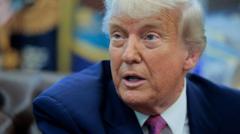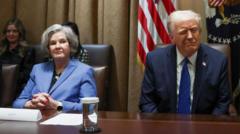Trump's recent comments indicate rising frustration regarding Russia's continued attacks and a stalled peace process.
Trump Sets Two-Week Countdown for Putin on Ukraine Negotiations

Trump Sets Two-Week Countdown for Putin on Ukraine Negotiations
Former President Trump suggests a deadline for Russian President Putin amid escalating violence in Ukraine.
In a pointed address from the Oval Office, former President Donald Trump hinted at a two-week timeframe to evaluate Russian President Vladimir Putin's intentions towards peace in Ukraine. While speaking to reporters, Trump reflected on the ongoing war, stating, "I'll let you know in about two weeks," adding that this period would help determine if Putin was genuinely looking to deescalate or merely "tapping us along."
As the Kremlin intensified its offensive, Trump's remarks came in response to some of the most severe Russian bombardments since the war began, including a deadly assault in Kyiv that left at least 13 people dead. Commenting on the violence, Trump expressed serious concerns, labeling Putin as "absolutely crazy" and warning that Russia was "playing with fire."
The former president's outburst underscores a growing frustration among U.S. officials as diplomatic channels appear increasingly unworkable. Recently, Trump had a lengthy phone conversation with Putin, that he characterized positively, yet soon afterward, Russia launched a significant military offensive against Ukraine, undermining any hopes for a swift resolution.
Despite previous threats from Trump to shift U.S. strategy, they have not influenced the Kremlin's stance. Critics have expressed skepticism over Trump's ability to challenge Russia, given his record of limited action and an inclination to appease. The Biden administration has maintained sanctions against Russia while seeking to mediate discussions, a strategy that some argue has inadvertently empowered Moscow.
In response to Trump's comments, a Kremlin spokesperson suggested that the former president might not fully grasp the situation, asserting that Trump appears unaware of the "terrorist attacks" against Russian cities attributed to Ukraine. The escalating conflict shows no signs of abating, drawing in external allies like Germany, which is assisting Ukraine in producing long-range missile capabilities.
The intricate dynamics of negotiations reveal a complicated path ahead, with Russia's demands appearing increasingly unreasonable, including a push for recognition of Crimea as Russian territory. Former U.S. Ambassador Michael McFaul noted these demands serve as a "poison pill," complicating any peace agreement. As both sides remain entrenched, the war's toll continues to be severe, with tens of thousands of casualties and significant destruction across Ukraine.
As the Kremlin intensified its offensive, Trump's remarks came in response to some of the most severe Russian bombardments since the war began, including a deadly assault in Kyiv that left at least 13 people dead. Commenting on the violence, Trump expressed serious concerns, labeling Putin as "absolutely crazy" and warning that Russia was "playing with fire."
The former president's outburst underscores a growing frustration among U.S. officials as diplomatic channels appear increasingly unworkable. Recently, Trump had a lengthy phone conversation with Putin, that he characterized positively, yet soon afterward, Russia launched a significant military offensive against Ukraine, undermining any hopes for a swift resolution.
Despite previous threats from Trump to shift U.S. strategy, they have not influenced the Kremlin's stance. Critics have expressed skepticism over Trump's ability to challenge Russia, given his record of limited action and an inclination to appease. The Biden administration has maintained sanctions against Russia while seeking to mediate discussions, a strategy that some argue has inadvertently empowered Moscow.
In response to Trump's comments, a Kremlin spokesperson suggested that the former president might not fully grasp the situation, asserting that Trump appears unaware of the "terrorist attacks" against Russian cities attributed to Ukraine. The escalating conflict shows no signs of abating, drawing in external allies like Germany, which is assisting Ukraine in producing long-range missile capabilities.
The intricate dynamics of negotiations reveal a complicated path ahead, with Russia's demands appearing increasingly unreasonable, including a push for recognition of Crimea as Russian territory. Former U.S. Ambassador Michael McFaul noted these demands serve as a "poison pill," complicating any peace agreement. As both sides remain entrenched, the war's toll continues to be severe, with tens of thousands of casualties and significant destruction across Ukraine.




















